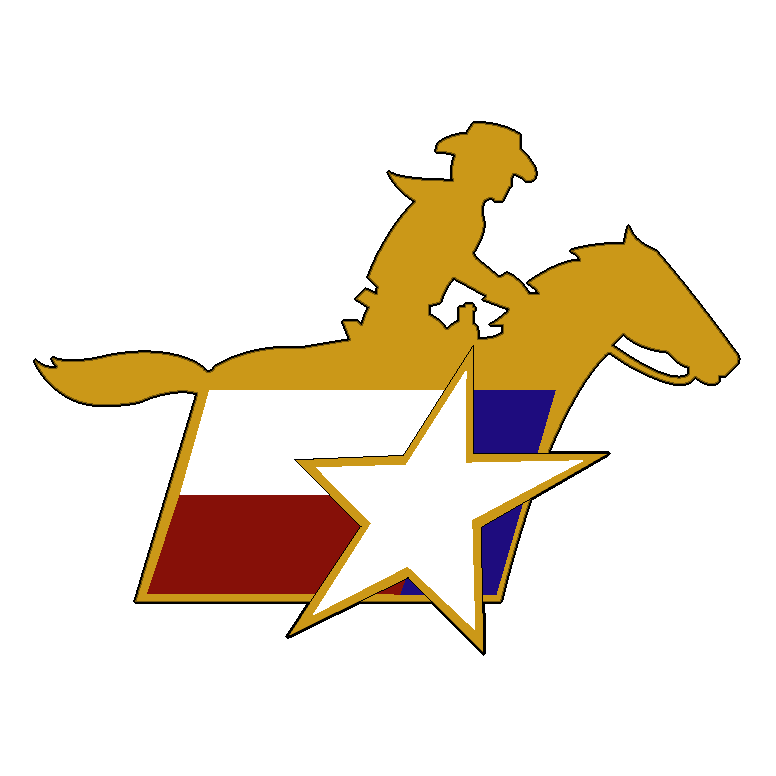
San Antonio Riders
From Wikipedia, the free
encyclopedia
| San
Antonio Riders |
| Year Founded | 1991 |
| Year Retired | 1992 |
| City | San Antonio, Texas |
| Team
Colors | Brown, Metallic Gold, Orange, White, Blue, Scarlet Red |
| Franchise W-L-T Record | Regular Season: 11-9 |
| Championships |
| World Bowls (0) |
The San Antonio Riders were a professional American football team that played in the WLAF
in 1991 and 1992. The team played in the Alamo Stadium in 1991 and then were forced to move to Bobcat Stadium on the campus
of Southwest Texas State University (now Texas State University) in San Marcos, Texas for the 1992 season.
The
team was owned by Larry Benson, the brother of Tom Benson (owner of the New Orleans Saints of the NFL). The limited partners
of the team were Tom Landry (Pro Football Hall of Fame coach for the Dallas Cowboys) and Tom Landry, Jr. The General Manager
was John Peterson.
The team's record in 1991 was 4-6. San Antonio turned things around in 1992 with
a mark of 7-3. The Riders were not able to compete in the highly competitive North American West Division during the 1992
season, and like Frankfurt of 1991, they did not make the playoffs despite a 7-3 record.
Former players
include professional wrestler John "Bradshaw" Layfield, better known as JBL of World Wrestling Entertainment (WWE),
Jason Garrett who not only went on to play with the Dallas Cowboys, but in 2007 became their offensive coordinator, and head
coach Mike Riley, who went on to coach the San Diego Chargers of the NFL.
After the 1992 season saw the
suspension of the WLAF (and ultimately the abandonment of North American teams), Benson applied to the Canadian Football League
to have the Riders join that league instead for the 1993 season. The CFL accepted, and admitted the Riders and the Sacramento
Surge/Gold Miners to the CFL. The Riders were to change names to the San Antonio Texans (there was already a Rough
Riders and a Roughriders, both of whom were known as the "Riders" for short), but the team folded abruptly prior
to the 1993 season. (The San Antonio Texans name would later be used for the aforementioned Gold Miners when they moved to
San Antonio in 1995.)
Season-by-season
Note: W = Wins, L = Losses, T = Ties
| Season | W | L | T | Finish | Playoff results |
|---|
| 1991 | 4 | 6 | 0 | 2nd
North American West | -- |
| 1992 | 7 | 3 | 0 | 3rd North American West | -- |
| Totals | 11 | 9 | 0 |
|---|
THE OWNER
THE COACH
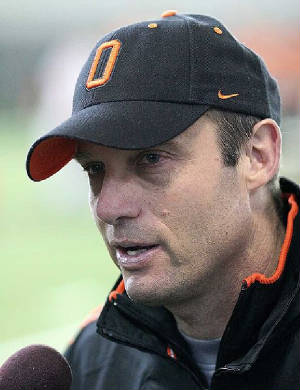
|
| Coach Mike Riley |
Michael Joseph Riley (born July 6, 1953) is an American football
coach and the current head coach of the Oregon State Beavers. Riley has also coached in several professional leagues, and
is a former head coach of the San Diego Chargers of the NFL and the Winnipeg Blue Bombers of the Canadian Football League
.
Biography
Early years
Riley was
born in Wallace, Idaho in 1953 and moved to Corvallis, Oregon in 1965. He grew up watching the Oregon State Beavers while
his father, Bud Riley, served as defensive coordinator under legendary coach Dee Andros from 1965–1972. Riley was a
hometown hero himself from his athletic days at Corvallis High School. Riley was the starting quarterback who led the Spartans
to the state title game in both 1969 and in 1970. They came up short against Medford High School in 1969, 27–0, but
avenged the loss the following season when they met Medford again and came out victorious 21–10.
He considers the college town of Corvallis, Oregon his hometown.
Playing career
Riley played college football at
the University of Alabama under legendary head coach Paul "Bear" Bryant. In his four seasons at Alabama, he helped
the Tide to four Southeastern Conference titles and the 1973 UPI (Coaches' Poll) National Championship.
Coaching career
Riley
began his coaching career immediately after his playing days ended, first as a graduate assistant at the University of California
in 1975, and then as a graduate assistant at Whitworth University where he received his Master’s degree in physical
education.
In 1977, he was hired as the defensive coordinator and secondary
coach at Linfield College. During his stay at Linfield he assisted head coach Ad Rutschman’s Wildcats to a six-year
record of 52–7–1, which included five conference titles and an undefeated NAIA Division II championship season
in 1982.
Riley coached the Winnipeg Blue Bombers of the Canadian Football
League from 1987-1990 and won two Grey Cups during his tenure. He also coached the San Antonio Riders
of the defunct World League of American Football. He was hired to coach the San Antonio Texans of the CFL in 1993, but the
team folded before it could begin play.
He returned to the college ranks
in 1993 when USC head coach John Robinson offered him the position of offensive coordinator and quarterbacks coach; he later
became assistant head coach. The Mesa Tribune named him the league’s top assistant coach in 1993 after leading
the Trojan offense to record setting numbers.[citation
needed] USC quarterback Rob Johnson earned numerous Pac-10 and NCAA records under Riley's tutelage and would
later become a first-round NFL Draft pick. “He’s a player’s coach, who gets the most out of you by treating
you like normal,” Johnson later said.[citation
needed]
Riley remained at USC through the 1996 season,
helping the Trojans to victories in the Rose, Cotton, and Freedom Bowls. USC won one outright league title, shared another,
and finished second one time.
Oregon State Beavers
Riley was hired as the head coach at Oregon State in 1997 to replace Jerry Pettibone.
In the Beavers' first season under Riley, they posted a record of 3–8. This was a difficult season for Riley as he attempted
to run his NFL-style offense with players recruited by Pettibone to run the wishbone triple-option.[citation needed] The 1998 season was another big
step in the right direction, with the Beavers posting a 5–6 record, their best record since 1971. The 1998 season was
capped off by a double-overtime 44–41 win over the Oregon Ducks in the Civil War game.
Although his first stint with the Beavers only lasted two seasons, Riley is considered, by FSN commentators,
to have laid the foundation for the success of the Beavers in the years to come. The 1999 team, led by Dennis Erickson, posted
a 7–5 record and earned a trip to the Oahu Bowl, ending a record[citation needed] 28 season streak of sub .500 seasons.
In the NFL
In 1999, Riley
left the Beavers to become the head coach of the NFL's San Diego Chargers. Riley coached the Chargers from 1999 to 2001, with
a record of 14–34. His last game was indicative of his last season, as the Chargers played well, but one poor play turned
the tide. The 2001 Chargers ended their season with a loss to the Seattle Seahawks, after Doug Flutie passed for 377 yards
and drove for the tying field goal with 16 seconds remaining, but poor special teams play led to a long Seahawks kick return
and subsequently a 54-yard winning field goal.
Riley was fired as head coach
of the Chargers and became an assistant coach of the New Orleans Saints. He was offered the University of Alabama job in December
2002 after Dennis Franchione left for Texas A&M.[citation
needed] Riley was also under consideration for the UCLA job during that period.[citation needed] After spending one season with
the Saints, Riley returned to become the head coach at Oregon State in 2003 following Erickson's departure for the NFL.
Return to the Oregon State Beavers
After starting the 2006 season 2–3, the Beavers went 9–4 on the regular season, including an upset
of #3 USC in Corvallis. The Beavers completed their impressive season with a win over Missouri in the Sun Bowl in El Paso,
Texas, ending their season with a 10–4 record.
In 2007, the Beavers
again started 2–3 and finished 8–4 on the regular season, including an upset of #2 Cal in Berkeley. The Beavers
finished the year 9–4 with a win in the 2007 Emerald Bowl in San Francisco, CA, over the Maryland Terrapins.
In 2008 Riley's Beavers knocked off #1-ranked USC 27–21 at Reser Stadium. The Beavers
went into the Civil War with a chance to reach the Rose Bowl as Pac-10 champions but were defeated by Oregon 65-38, and instead
accepted another invitation to the third place Sun Bowl, where they beat Pitt 3-0.
Riley
has a 5–1 NCAA football bowl record as a head coach, having won the 2003 Las Vegas Bowl, 2004 Insight Bowl, 2006 Sun
Bowl, 2007 Emerald Bowl, and 2008 Sun Bowl. Riley is a combined 8–1 in bowl games as a head or assistant coach. In the
2009 Maaco Bowl Las Vegas, the Beavers lost to the BYU Cougars of the Mountain West Conference.
In Riley's second stint the Beavers have produced two current NFL quarterbacks, Matt Moore and Derek Anderson.
Riley was rumored to be up for the USC vacancy created by the resignation of Pete Carroll,
but those rumors were put to rest by signing a 3-year extension through the 2019 season.
wikipedia.org
The Uniform
1991 Riders Uniform
The 1991 San Antonio Riders jersey was different from the 1992 one in a major way. When the uniforms
were being screen printed, they forgot to print the Riders logos on the sleeves so the 1991 jerseys only have the stripes
on them.
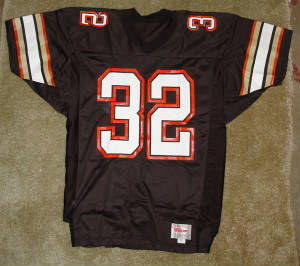
|
| 1991 Riders Home Jersey |
|
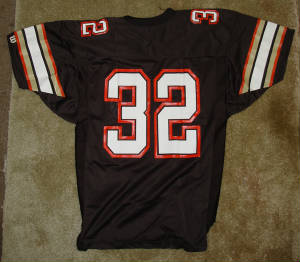
|
| 1991 Riders Home Jersey (back) |
|
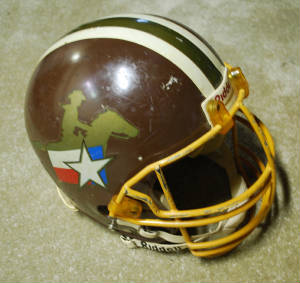
|
| 1991 Riders Helmet |
|
| |
|
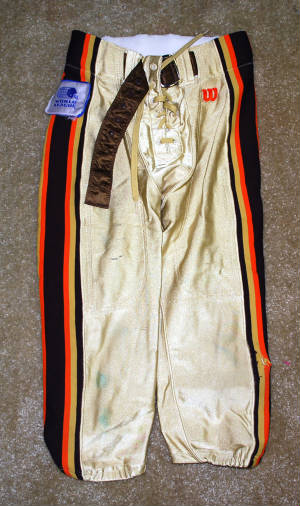
|
| 1991 Riders Pants |
|
1992 Riders Uniform
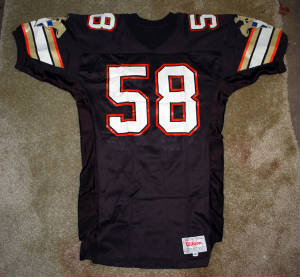
|
| 1992 Rider Home Jersey |
|
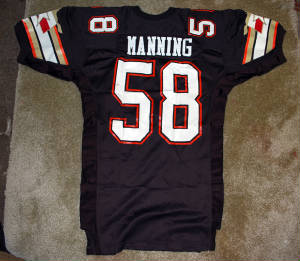
|
| 1992 Riders Home Jersey (back) |
|
|
| |
|
|
Alamo Stadium (1991)
Alamo Stadium is a 23,000-seat football stadium in San Antonio,
Texas.
High school
football games
Since its opening in the 1940s, the stadium has been
home to numerous high school games.
Pro football
franchises that used the stadium
Completed in September 1940 as
a WPA project, the stadium was the home of the Alamo
Bowl in 1947, the San Antonio Wings
of the WFL in 1975, the San Antonio
Gunslingers of the USFL from 1984-1985,
the San Antonio Riders of the WLAF in 1991, and the San Antonio Matadors of the Spring Football League in 2000.
College football games hosted
The stadium has
also hosted college football games. Texas A&M defeated Tulsa, 41-6, on Oct. 5, 1940 and Baylor University defeated Villanova, 7-0, two weeks later on Oct.
19, 1940.
Alamo Stadium today
The stadium is still standing and is currently owned by the San
Antonio Independent School District. It is the largest high school stadium in the state of Texas.
The stadium is currently used by the high schools of the SAISD, including Brackenridge, Burbank, Edison, Fox Tech, Highlands,
Sam Houston, Jefferson, and Lanier High Schools for mainly High School football games. The venue is home of the Annual Chili
Bowl Game, a football game between Fox Tech and Lanier High Schools. It regularly sells out, and is consistently one of the
highest attended regular season football games in Texas, averaging about 23,000 spectators.Its also home to track meets hosted
by SAISD, also home to the Region IV-4A & Region IV-5A track meets which occur in late April or early May.
Bobcat Stadium (1992)